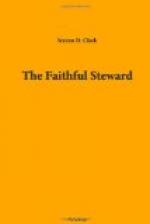Then let every one, whether indigent or affluent, frequently lay by in store sums for charity as God shall prosper him, though they are but small; and let him do it with the same whole-heartedness, earnestness, and perseverance, as he would to increase his own wealth; and rarely will he be unable to relieve the cries of misery. He will have no occasion to offer the excuse, “I have no change.” He will have dollars in store. The history of benevolence proves this. I have know a sabbath-school class, by each member’s giving 10, 15, or 25 cents a month, contribute an amount during the year, which previously they would have thought impossible to raise. This is only one instance among a thousand. Let the principle be acted upon; a trial is easy. Scriptures and reason cannot both be wrong.
But how shall these frequent contributions be made by those whose capital yields returns only at long intervals? According to the proverb, “Where there’s a will, there’s a way”—it can be either actually or virtually done.
1st. By saving expenses. Water, running into a vessel no faster at a given orifice than it flows out at another, will retain a constant level; and if with the same influx we would have it issue at a higher orifice, we have only to stop or lessen the lower one. Thus, if we would have our possessions rise to the giving point, we have only to stop the leakage—check expenses. This hint may be of service to the poor, and not inappropriate to the rich. Many expend their ready money as rapidly as they receive it; making their calculations to do so; and thus, during the interval between one return of capital and another, plead their inability to meet the frequent calls of benevolence. But is this a valid excuse? Could they not be met by sacrificing some social pleasure, some luxury in drink, in food, in dress, in furniture, in display? or by foregoing some convenience, the expense of which is equivalent to the pledged sum? Vast multitudes are deprived of these luxuries, and even of what we deem necessaries, during their whole lives; and cannot we forego the gratification of them occasionally, that we may thereby relieve the suffering, or save the deathless soul? True, this will require self-denial; but has not God demanded of us self-denial? Dare any one offer this as an excuse?




